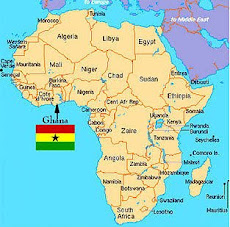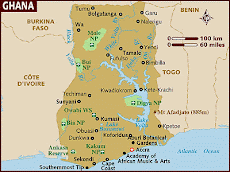It feels good to be in French-speaking countries, that have cheese, coffee and whole-meal bread! Togo and Benin are both very poor countries. The United Nations uses the “Human Development Index” as a measure of the wealth, welfare and state of development of a country. This index includes comparative measures of life expectancy, literacy, education and standards of living. Out of 182 countries, Norway is top; the USA is 13th and the UK is 21st. Ghana is ranked at 152, with Togo at 159 and Benin as 161. Sierra Leone, Afghanistan and Niger are at the bottom.
According to 2008 figures, all 15 West African countries together owe a total of 75 billion dollars to rich-world lenders. This averages out at more than 300 dollars for every adult and child. To put this into a global perspective, this debt is the equivalent to 2 months of the USA’s annual defence expenditure of approximately 450 billion dollars.
We have spent a short amount of time in Togo, the smallest country in West Africa, with a population of about 6 million. The border crossing from Ghana to Togo was the most busy and chaotic that we have ever encountered. It was fascinating to just sit and watch everything happening. Somehow or other, we managed to get visas and enter Togo.
Lome, the capital, is a very sad place. It reminds us so much of our visit to Haiti years ago, in that there are typical French, tree-lined avenues, bordered by once-beautiful buildings, including hotels, that are now in a state of decay or are closed down completely. Lome was once a centre of international trade from all over the world, whereas now it is clearly struggling. The “grand marche” and other market areas have empty stalls. There are many unemployed young people around, and there is an air of desperation in the streets.
Much of this situation is due to Togo’s recent history. The country became a German protectorate in 1884 (called Togoland). The Germans used forced labour and other repressive measures to ensure the production of coffee and cocoa. At the end of the First World War, a third of Togoland was placed under British administration and two- thirds, corresponding to the current borders of Togo, was placed under French administration. (The British third of the original Togoland is now part of Ghana.)
The Germans and then the French groomed a class of coastal peoples to be an educated elite of civil servants. After independence in 1960, these peoples inherited political power and economic advantages, leading inevitably to ethnic tensions, which have continued ever since. Added to this is 38 years of rule by a military dictator, Etienne Eyadema, during whose time thousands of people died, as a result of his repression, torture and murder.
In 2005, his son Faure Gnassingbe took over the presidency. The first, fairly peaceful democratic elections took place in 2007. There were further peaceful elections this February, and Gnassingbe remains in power. Togo’s relations with Ghana and Benin are very tense, since both countries are accused of harbouring and supporting political exiles from Togo during recent decades.
We visited Togo’s small national museum in Lome. This features musical instruments, including the iron instrument below, which is still used today, both for ceremonies and for summoning people in the villages to come together at important times.

Both Togo and Benin are part of what was once called the “slave coast”. The centre of the slave trade in Benin was the town of Ouidah, where some of the largest slave markets were sited. Here we visited some very moving monuments to the slave trade. The “gate of no return” marks the spot where slaves were loaded onto ships in chains and sent mainly to Brazil (by the Portuguese) and Haiti (by the French). The last slave ship (Portuguese) left Ouidah in1885.

Before being loaded onto ships, each slave had to circle the “tree of forgetfulness”, 9 times for men and 7 times for women. This was aimed at making them put all memories of their homes, families and culture behind them. This monument is positioned where the tree once stood.

The Christian churches in Benin recognise the significant role they played in supporting the slave trade and, in recent years have erected a monument to the slaves and the abolition of the slave trade.

As in Ghana, there are many religious practices in both Togo and Benin, including Voodoo. We first came across Voodoo in Haiti and, of course, slaves from this part of Africa took their Voodoo beliefs with them to Haiti.
Most followers of Voodoo believe in a supreme god, Mawa. The word Voodoo refers to the spirits or intermediary gods, all of whom are associated with the natural world or with the ancestors (as in Ghanaian traditional religions). There are male and female Voodoo priests who are said to be able to become “possessed” by the spirits, thus displaying the positive or the negative emotions of any particular spirit.
The benevolence of the spirits is sought by making offerings at special fetish shrines. (A fetish is an ordinary object imbued with the sacred power of one or more of the spirits.) There are many voodoo temples and fetish shrines around both Togo and Benin. One of the spirits, Dangbe, who is associated with life and movement, is represented by the snake. The picture below shows the “Temple of the Python” in Oidah, which is dedicated to Dangbe. Here, we had the pleasure of fraternising with several dozen live pythons. These pythons are sacred and they roam around the town to feed, always returning to the temple.

Across the road from this temple is a Portuguese Christian church. It is clear that many people (known as 50:50s) integrate their traditional voodoo beliefs with their Christian faith, and they visit both the temple and the church on the same day. The Catholic saints, like the Voodoo spirits, are viewed as the intermediaries to the supreme God. For example, St. Patrick is seen as the incarnation of the snake spirit, Dangbe.

Benin is a country of about 9 million people. It has virtually no mineral wealth and relies heavily on the production and sale of both palm oil and cotton. On the world markets, it has to compete with countries that have the resources to subsidise their cotton industry, notably the USA. This obviously adds to Benin’s economic problems.
We stayed for 3 nights in the business capital, Cotonou. Unemployment is very high, and people have clearly found ingenious ways of making a living. For example, there are thousands of motorbike taxis, with no number plates or crash helmets. This whole business is unregulated, but the government turns a blind eye, because of the lack of alternative opportunities for people to make a living, not to mention the absence of alternative means to move around the city.
The same is true of the sale of fuel for cars and motorbikes. Throughout Cotonou and the capital city, Porto Novo, there are numerous roadside stalls piled high with plastic bottles of fuel for sale. This fuel is smuggled illegally from nearby Nigeria, but the government again takes no action, because at least people are able to have a livelihood.
Just north of Cotonou is Lake Nokoué. We had a very interesting visit to a stilt village on this lake. Ganvie is the largest stilt village in West Africa, with a population of about 30,000 people. We were taken by boat, 5 kilometres across the lake to get to the village.
Everything is on stilts: houses, shops, cafes, schools etc. All movement between the various buildings is by canoe.

 The village relies on fishing. They have a very clever mechanism for trapping the fish. They plant branches under the water to form a network of fences in which fish become trapped. Gender roles are very clearly defined. Men and boys do all the setting of traps and fishing.
The village relies on fishing. They have a very clever mechanism for trapping the fish. They plant branches under the water to form a network of fences in which fish become trapped. Gender roles are very clearly defined. Men and boys do all the setting of traps and fishing.

Women and girls take the fish to market on the edge of the lake in their canoes.


At the market, the women sell the fish and use the money to buy provisions both for their families and to sell back in Ganvie. It is clearly a very hard life, lived out in a very challenging environment.



Ganvie has been in existence for over 300 years. The people are of the Tofinu tribe. During the 16th and 17th centuries, people from the powerful kingdom of Da Homey (further north) raided other villages to supply slaves to meet the demands of the European slave traders. The Tofinu escaped and set up their village on the lake. (Ganvie means “safe community”.) They were safe here, because the religious beliefs of the Da Homey people prevented them from crossing over water.
We are now back in Ghana. The BA strike has delayed our return home by one day only, we hope. Our final blog entry should come from London next week.
 We were rather surprised to find that our names had been written on all the furniture that was provided!!
We were rather surprised to find that our names had been written on all the furniture that was provided!!



 This results in very little school attendance during the rainy season.
This results in very little school attendance during the rainy season.







































.jpg)
.jpg)
.jpg)
.jpg)
.jpg)
.jpg)
.jpg)
.jpg)
.jpg)
.jpg)
.jpg)
.jpg)
.jpg)
.jpg)
.jpg)
.jpg)


